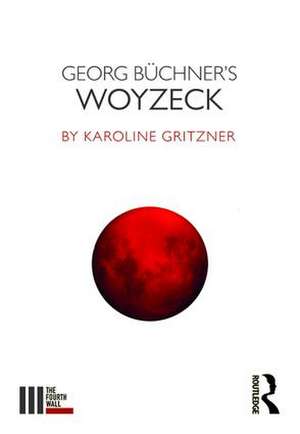Georg Büchner's Woyzeck: The Fourth Wall
Autor Karoline Gritzneren Limba Engleză Paperback – 8 feb 2019
Georg Büchner’s Woyzeck was left unfinished at the time of its author’s death in 1837, but the play is now widely recognised as the first ‘modern’ drama in the history of European theatre. Its fragmentary form and critical socio-political content have had a lasting influence on artists, readers and audiences to this day.
The abuse, exploitation, and disenfranchisement that Woyzeck’s titular protagonist endures find their mirror in his own murderous outburst. But beyond that, they also echo in the flux and confusion of the various drafts and versions in which the play has been presented since its emergence.
In this fresh engagement with a modern classic, Gritzner examines the revolutionary dimensions of Büchner’s political and creative practice, as well as modern approaches to the play in performance.
Din seria The Fourth Wall
-
 Preț: 76.45 lei
Preț: 76.45 lei -
 Preț: 76.53 lei
Preț: 76.53 lei -
 Preț: 61.36 lei
Preț: 61.36 lei -
 Preț: 76.70 lei
Preț: 76.70 lei -
 Preț: 84.62 lei
Preț: 84.62 lei -
 Preț: 76.41 lei
Preț: 76.41 lei -
 Preț: 83.77 lei
Preț: 83.77 lei -
 Preț: 76.66 lei
Preț: 76.66 lei -
 Preț: 76.77 lei
Preț: 76.77 lei -
 Preț: 83.93 lei
Preț: 83.93 lei -
 Preț: 91.68 lei
Preț: 91.68 lei -
 Preț: 84.04 lei
Preț: 84.04 lei -
 Preț: 77.77 lei
Preț: 77.77 lei -
 Preț: 77.21 lei
Preț: 77.21 lei - 18%
 Preț: 76.29 lei
Preț: 76.29 lei - 26%
 Preț: 61.94 lei
Preț: 61.94 lei - 19%
 Preț: 62.36 lei
Preț: 62.36 lei - 26%
 Preț: 62.82 lei
Preț: 62.82 lei - 23%
 Preț: 235.21 lei
Preț: 235.21 lei - 31%
 Preț: 764.20 lei
Preț: 764.20 lei - 19%
 Preț: 61.94 lei
Preț: 61.94 lei
Preț: 76.55 lei
Nou
Puncte Express: 115
Preț estimativ în valută:
14.65€ • 15.33$ • 12.12£
14.65€ • 15.33$ • 12.12£
Carte disponibilă
Livrare economică 15-29 martie
Livrare express 01-07 martie pentru 68.46 lei
Preluare comenzi: 021 569.72.76
Specificații
ISBN-13: 9781138962965
ISBN-10: 1138962961
Pagini: 84
Dimensiuni: 119 x 172 x 5 mm
Greutate: 1.42 kg
Ediția:1
Editura: Taylor & Francis
Colecția Routledge
Seria The Fourth Wall
Locul publicării:Oxford, United Kingdom
ISBN-10: 1138962961
Pagini: 84
Dimensiuni: 119 x 172 x 5 mm
Greutate: 1.42 kg
Ediția:1
Editura: Taylor & Francis
Colecția Routledge
Seria The Fourth Wall
Locul publicării:Oxford, United Kingdom
Public țintă
General, Professional Practice & Development, and UndergraduateCuprins
1 Woyzeck the open wound
2 History, politics, tragedy
3 The fragmentary demand
4 Woyzeck in performance
References
Index
2 History, politics, tragedy
3 The fragmentary demand
4 Woyzeck in performance
References
Index
Notă biografică
Karoline Gritzner is a Lecturer in Theatre Studies at Aberystwyth University, UK. Her research focuses on the interconnections between theatre and philosophy, and she is a core convenor of the research network Performance Philosophy.
Descriere
Georg Büchner’s Woyzeck was left unfinished at the time of its author’s death in 1837, but the play is now widely recognised as the first ‘modern’ drama of European theatre. In this fresh engagement, Gritzner examines the revolutionary dimensions of Büchner’s political and creative practice, and modern approaches to the play in performance.
